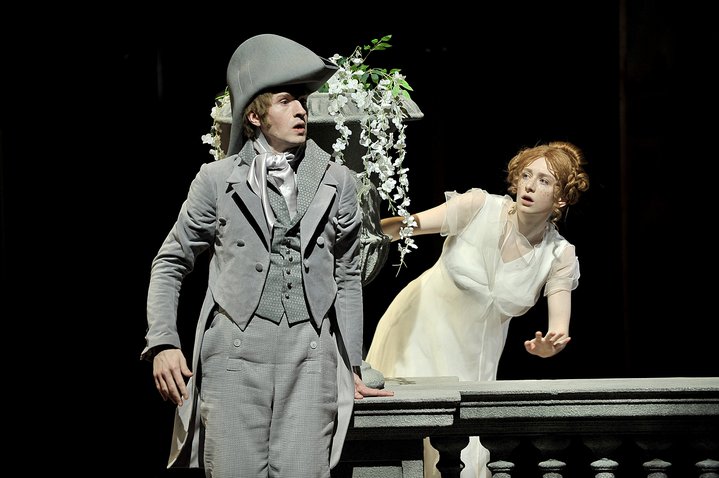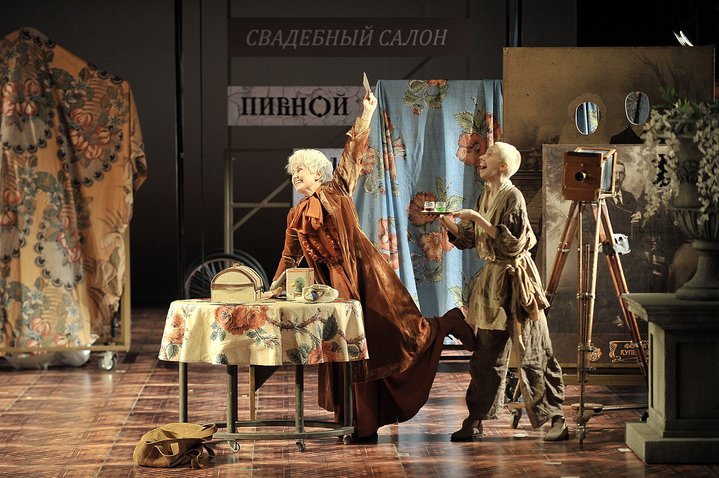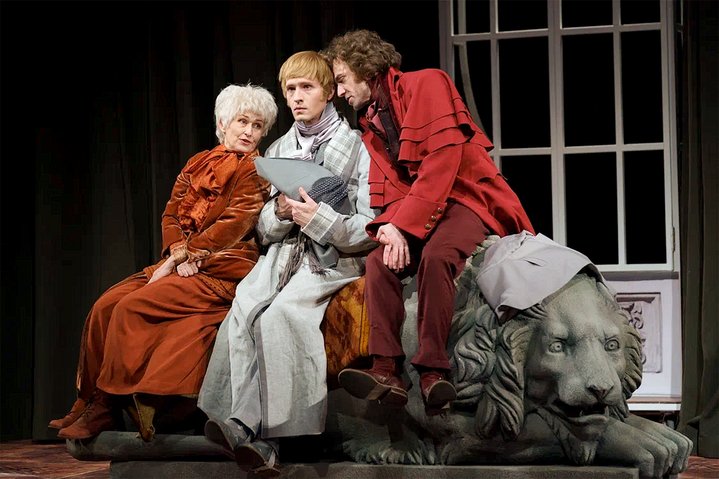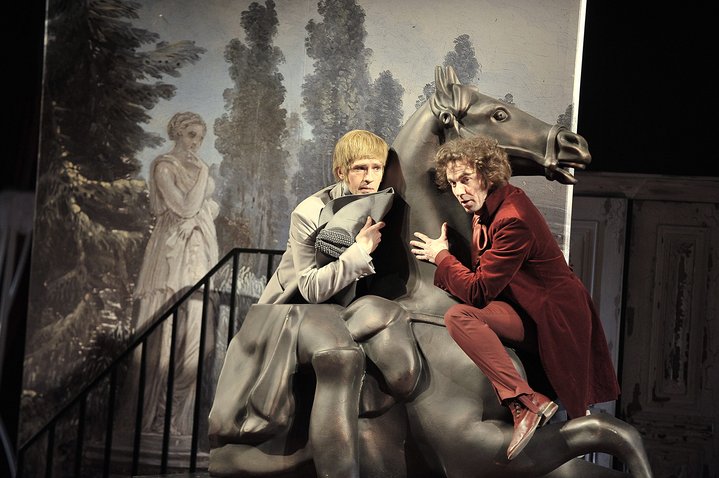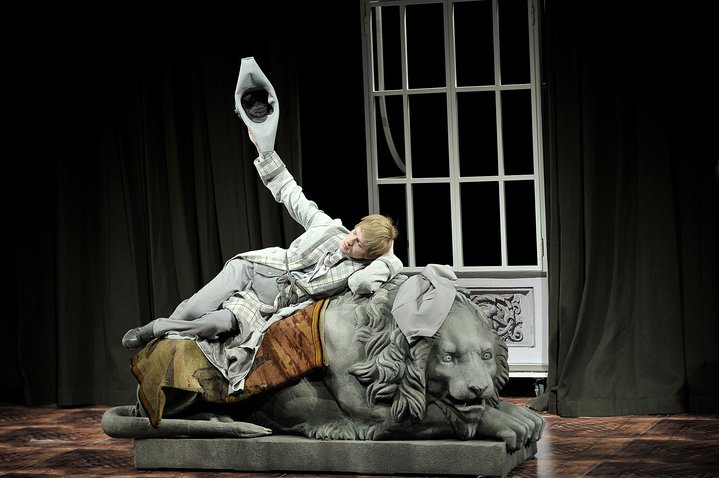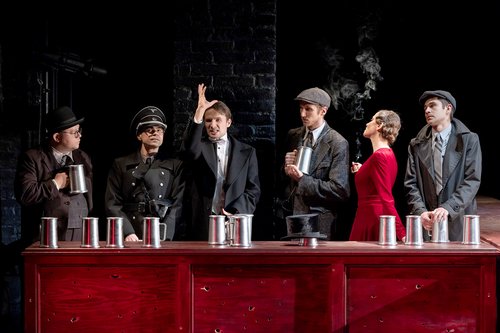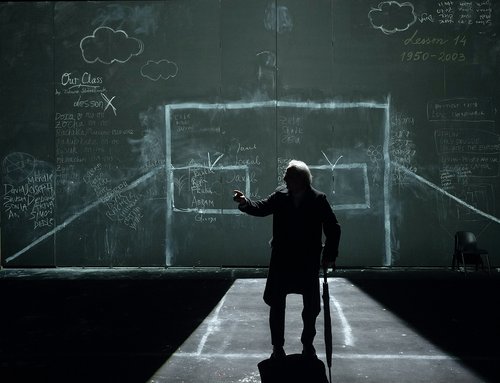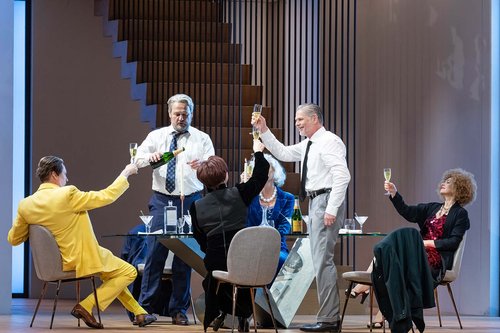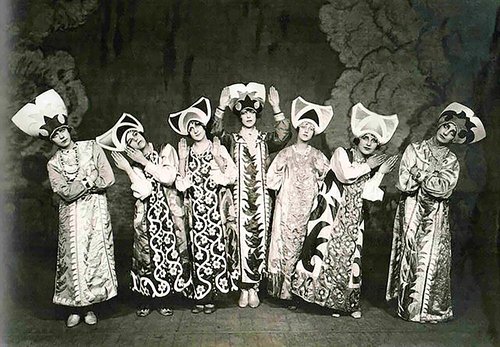Korina and Upstaging Gogol
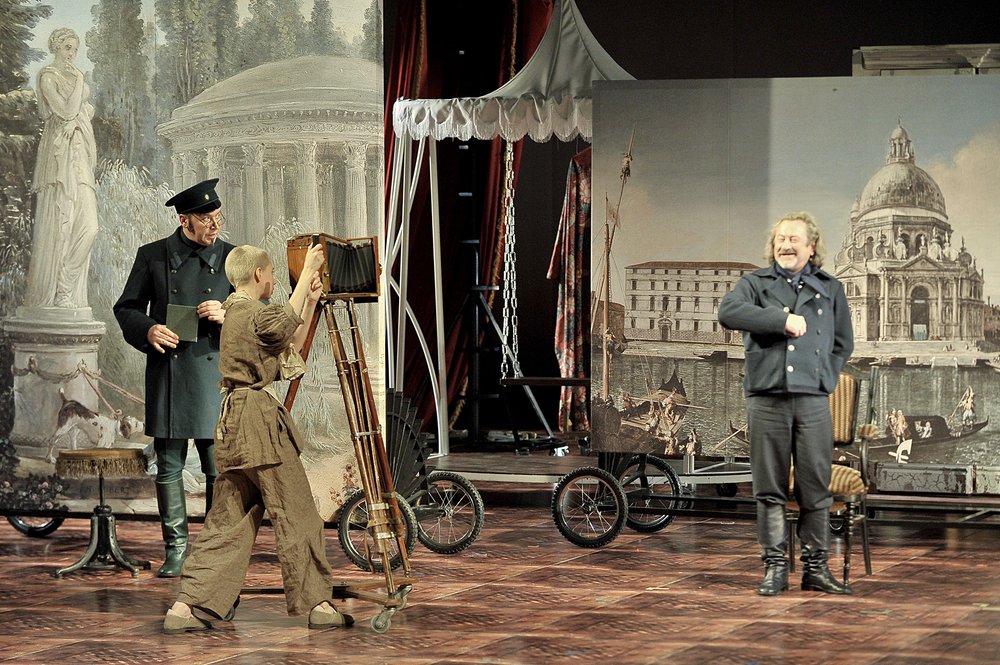
Absolutely Incredible Event. Pyotr Fomenko Workshop Theatre. Moscow, 2024. Photo by Larisa Gerasimchuk. Courtesy of Pyotr Fomenko Workshop Theatre
‘Absolutely Incredible Event’ is a distinctive production of Nikolai Gogol’s play ‘Marriage’ by Pyotr Fomenko’s Workshop Theatre, and is exciting audiences used to more conventional fare in this bastion of traditional theatre in the Russian capital.
It is perhaps an unlikely marriage: traditional theatre and contemporary art, yet Russian artist Irina Korina (b.1976) has created bold sets for Pyotr Fomenko’s Workshop Theatre in Moscow otherwise known for its predictable repertoire of Russian classics. Over three decades Pyotr Fomenko’s Workshop Theatre in Moscow has turned out plays by grandees the likes of Alexander Pushkin, Nikolai Gogol, Lev Tolstoy and Anton Chekhov. The very first production, which took place in 1993, was staged by graduates of Fomenko’s workshop at GITIS theatre school, based on Alexander Ostrowsky’s play ‘Wolves and Sheep’. Today this play still remains a firm favourite in the workshop’s repertoire, with the most subtle psychological shades of intonation and nuance.
For graduate students of Pyotr Fomenko’s workshops, tradition is central to their success. They refer to themselves unapologetically as the ‘old men’ and talk in unison about how their teacher’s favourite writer was Alexander Pushkin. But Nikolai Gogol was also among his favourites and Pyotr Fomenko (1932–2012) staged numerous productions based on Gogol’s plays, as has his successor, director Yevgeny Kamenkovich who has headed the theatre since 2012. Unlike the perfectionist Fomenko, for whom it was sacrilegious to change the original titles, Kamenkovich takes more liberties. The current production, Gogol's 1833 play ‘Marriage’ about the escapades of a governmental official who wants to get married, is engaged to the daughter of a rich merchant, but who runs away, jumping out the window on the eve of their wedding, is titled ‘Absolutely Incredible Event’. No longer a domestic genre sketch, it has turned into a circus extravaganza.
Fomenko’s workshop has always been known for a few trademark techniques he employed in which he transformed productions of classic plays into something that could speak to a contemporary audience. Firstly there is always a slavish attention to the original text, a deep immersion in historical material and this creates a sense of timelessness in the action. Then, there is a deep psychological study of each of the characters, where even a horrible fool can invite our sympathy. And finally, there is a Mozartian acceptance of the world as it is, the simple delight in acting itself. Fomenko performances are an endurance of perfection, and as the ‘old men’ like to say, there is no such thing as a finished work. In each and every subsequent performance they make the smallest of adjustments, a little tweak here and there.
Add to this precise mix one of Russia’s most successful contemporary artists, whose work has previously been represented at the Venice Biennale, Irina Korina, and you may have a surprising result but the theatre is not unfamiliar territory for Korina who initially studied to be a stage designer, is a graduate of GITIS – although this is her first work for Pyotr Fomenko’s Workshop.
Korina’s style has always been spectacular and eye-catching. She has a taste for vintage objects from the Soviet era as well as post-Soviet kitsch and these create an immediate dissonance with Fomenko’s visual homeopathy, where normally there are very few objects on stage with props such as stools and cushions sourced from antique shops to preserve the spirit of the era. For Vladimir Maximov, Fomenko’s chief designer until 2014 who designed almost all of the workshop's productions, stage sets were ascetic and multifunctional mechanisms primarily to help the actors in their work.
In this production, however, Korina’s cumbersome constructions demand your attention. Everything is mounted on wheels: the protagonist Podkolesin sleeps on a lion on wheels, driven by his servant Stepan, and decorative paintings are wheeled onto the stage. They all bring a certain shape to the production. Like a circus performance the action is divided into independent scenes. In 19th century St Petersburg there is always a granite lion and here a stone lion both roars and meows like a cat. At the end of each scene, the actors sing their words in a common refrain evoking Bertolucci’s ‘The Dreamers’. A few end with the sound of a kettledrum roll, just like in the circus. And the finale is explosive: like a poltergeist there is a glass bottle which shatters into tiny pieces, bringing the matchmaking story to its end.
When Gogol wrote ‘Marriage’ in 1833, photographic studios had begun to open for the masses in Europe, and in the second act, the director and the artist set the action in the house of bride Agafya Tikhonovna, played by Olga Bodrova, organizing the action around portrait photographs of the era. Every groom invited to the house by matchmaker Fekla Ivanovna, is photographed by Dunyasha against the background of the paintings which are hanging on the walls of the house, fashionably Italian vedutas, views of Venice, and pastorals. Each groom is photographed against the background of a painting to which he can relate such as retired sailor Zhevakin who is photographed against Venetian canals. All the pictures are rolled across the stage on wheels with inflatable tyres, enabling fast rearrangements on stage. The only thing that remains constant throughout is a giant fist on the sign of the family´s trading house, or perhaps it is the heavy hand of the father that at night time brought Agafya Tikhonovna's mother down to size. From time to time, this hand depicted on the signboard of the family business falls down with a rumbling sound hinting at blatant violations of merchant tradition.
Podkolesin’s friend Kochkarev, who is played by Yuri Butorin, fluttering around the stage like a winged cupid reciting Pushkin tries hard to find him a wife. The groom's servant Stepan, played by Boris Yanovsky, who normally is depicted as cleverer than his boss, is a kind of Woodhouse Jeeves. Formal strict adherence to the text of the play and its epoch emphasizes its timelessness, and the universality around the theme, which allows the theatre to play with Gogol’s original words, visualizing them on the basis of contemporary readings.
A small figure in a top hat and a coat with a pelerine, as if an animated book illustration of Gogol’s St. Petersburg stories, makes its way through grey, rainy St. Petersburg. Now the stage is covered by a snow blizzard, and the figures line up at the front of the stage just as the guests wander around at the beginning of ‘The Nutcracker’ ballet staged by Yuri Grigorovich and Simon Virsaladze, which has been on the stage of the Bolshoi for over half a century. Here we see Podkolesin cover himself with a striped blanket and fall asleep on the back of a lion, evoking another diehard hero of 19th century Russian classical literature, Goncharov’s Oblomov.
The matchmaker Fekla Ivanovna played by Madlen Dzhabrailova is dressed in a striking, peach-coloured suit designed by Maria Borovskaya, and nervously flies onto the stage. On her back there is the footprint of a shoe echoing an unpleasant conversation with one of the rejected grooms, Yaichnitsa. There is no hint of anyone being physically beaten in the play, but Yaichnitsa calls the matchmaker an ‘old sole’. Here it all is: visualization, a careful reading of classic literature and the magic of reincarnation in the theatre.






